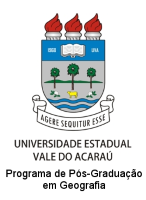KARST IN URBAN AREAS
Resumo
In its third edition, the "William Morris Davis - Journal of Geomorphology" presents its
second interview with geographers, to head the "Interviews" section, which opens each published
issue. This time, it is the first international interview, carried out with Professor Philip van Beynen,
from the University of South Florida, in the United States. Professor Philip van Beynen was
interviewed on the topic "Karst in Urban Areas", and brings important data on the subject, with
beautiful illustrations and with examples from all over the world. The interview took place on
September 17, 2020, with the participation of Vanda de Claudino-Sales (Professor of the Academic
Master in Geography at the State University of Vale do Acarau-UVA) and Saulo Roberto Oliveira
Vital (Professor of the Department of Geography and the Post-Graduate Program in Geography at
the Federal University of Paraiba - UFPB), and was transcribed by Diego Nunes Valadares, master's
student on Geography at the Federal University of Rio Grande do Norte.
Professor van Beynen was born in New Zealand, where he received his degree in Geography
at the University of Auckland. He earned a master's degree from the same university, and a
doctorate and post-doctorate from McMaster University, Canada. He has been a professor at the
School of Geoscience at the University of South Florida since 2009, where he has been developing
research related to different components of karst environments. The interview shows his great
expertise on the subject, and is very much worth to be read and seen even for those who are not
specialists in karst.
Downloads
Publicado
Como Citar
Edição
Seção
Licença
This work is licensed under a Creative Commons Attribution 4.0 International License.
Autores que publicam nesta revista concordam com os seguintes termos:
- Autores mantém os direitos autorais e concedem a William Morris Davis o direito de primeira publicação, com o trabalho simultaneamente licenciado sob a Creative Commons Attribution License (CC-BY 4.0), que permite o compartilhamento do trabalho com reconhecimento da autoria do trabalho e publicação inicial nesta revista.
- Autores têm autorização para assumir contratos adicionais separadamente, para distribuição não-exclusiva da versão do trabalho publicada nesta revista (ex.: publicar em repositório institucional ou como capítulo de livro), com reconhecimento de autoria e publicação inicial nesta revista.
- Autores têm permissão e são estimulados a publicar e distribuir seu trabalho online (ex.: em repositórios institucionais ou na sua página pessoal) após o processo editorial, já que isso pode aumentar o impacto e a citação do trabalho publicado (Veja O Efeito do Acesso Livre).
- Autores são responsáveis pelo conteúdo constante no manuscrito publicado na revista.







